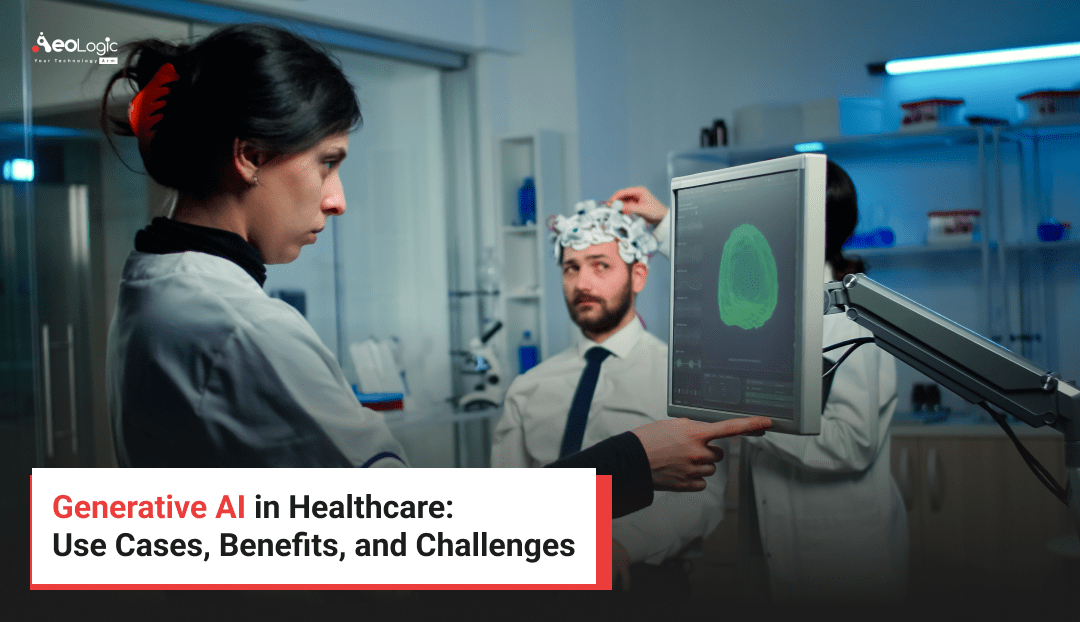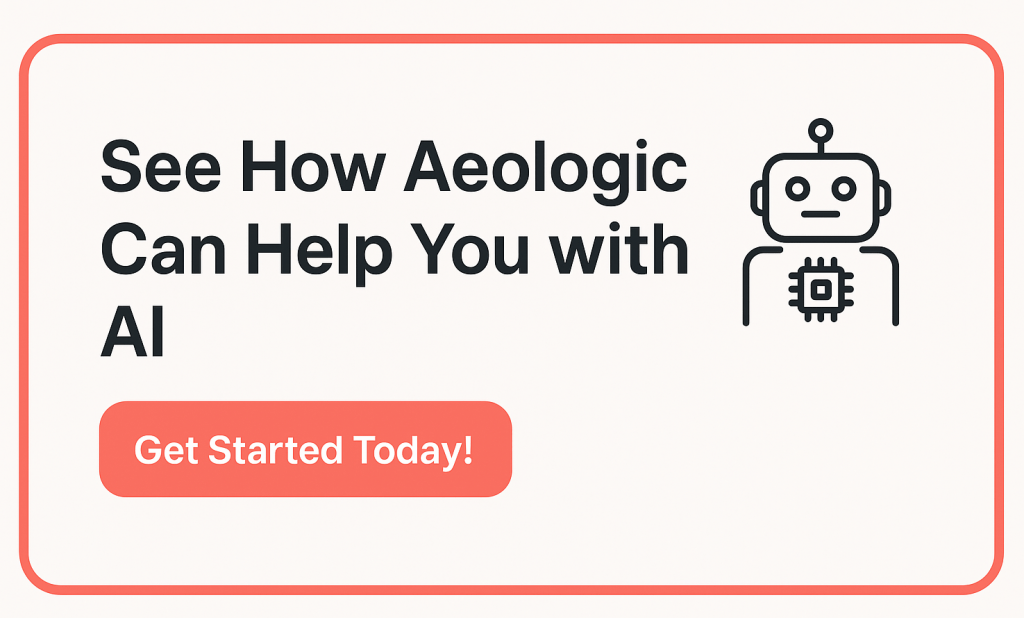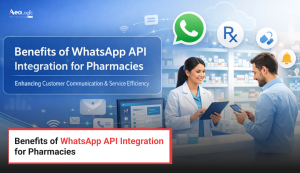The healthcare sector is currently experiencing an age of transformation. This revolution is the result of an increasing shortage of healthcare experts and an increase in the total cost of healthcare. Thus, the healthcare sector is seeking to implement new technology-based solutions and processes that can address these escalating challenges and reduce costs. Generative AI in healthcare is a game-changer for healthcare organizations, given the vast amount of unstructured data that is generated daily.
It converts patient interactions into clinical notes in a matter of seconds, thereby automating time-consuming administrative duties. This leads to an increase in patient satisfaction, and healthcare professionals can establish more intimate relationships with their customers.
In the past, physicians required a significant amount of time to review and analyze logs and data. However, Generative AI is now available to synthesize medical information and assist clinicians by producing medical drafts and summaries.
According to a report released by Deloitte, the implementation of AI in healthcare is just the beginning, presenting exciting prospects for healthcare stakeholders and consumers in the future.
At present, the healthcare ecosystem is confronted with a variety of challenges, including:
- Healthcare professionals are in limited supply.
- The heavy responsibilities of clinicians are causing them to experience burnout.
- The quality of health outcomes is being impacted by the lack of personalized attention and treatment plans provided to patients.
In order to address all of these issues, healthcare organizations should implement this innovative technology, which is also known as Generative AI.
By the end of this blog, you will gain knowledge regarding the potential advantages of Generative AI in healthcare, as well as its applications.
Looking for? Generative AI Solutions Aeologic
What is Generative AI?
Generative AI entails the training of AI models to enable them to comprehend the patterns and structures present in existing content.
It subsequently employs the same patterns to learn from existing data and generate new output, including text, audio, video content, and images.
ChatGPT, Dall-E, Bard, and Mid-Journey are among the many examples of Generative AI.
Generative AI operates on two distinct models: large language models (LLMs) like ChatGPT/Bard and image-based models.
Generative AI has a variety of applications, including the generation of text, the creation of code in various languages, the analysis of emails and data, and the function as a conversational chatbot.
We are Generative AI Solutions Provider in India
What Is Generative AI in Healthcare?
Generative AI (GenAI) is a form of artificial intelligence that is capable of producing auditory, visual, and textual content. The current use cases of GenAI are quite extensive, ranging from summaries, essays, and marketing materials to images, videos, and music. Despite the fact that the technology is not novel, the recent introduction of generative adversarial networks (GANs) and transformers has facilitated the significant evolution of large language models (LLMs).
The application of data science in healthcare has enabled developers to train models at a faster pace and with a greater amount of data, thereby revealing genuinely remarkable capabilities. The technology will continue to improve, despite the fact that the early stages of development resulted in some inconsistencies and issues. Additionally, companies from a variety of sectors can enhance their workflow, automate numerous duties, and provide personalized patient care by leveraging their current capabilities.
In healthcare, generative AI models can assist clinicians in a variety of ways, including the diagnosis of diseases, the provision of personalized medication, the advancement of drug discovery, and more. Although physicians continue to make decisions, a variety of administrative and data-analysis tasks can be delegated to a machine.
As per research, AI enhances the work of 40% of healthcare providers’ working hours.
McKinsey’s research shows that the adoption of GenAI has increased significantly in the past year, indicating that the implementation of GenAI will continue to expand across various sectors. The healthcare industry’s data also supports these statistics: The majority of healthcare providers have either already implemented AI algorithms or are planning to do so in the near future. Additionally, the same survey demonstrates that healthcare organizations have already realized returns on their investments.
Explore more: Why Generative AI Consulting Services are Essential for AI-Driven Innovation
How does Generative AI in Healthcare Work?
Generative AI, formerly referred to as generative artificial intelligence, is a type of AI that focuses on producing new material or synthetic data in the form of writing, images, or other media. AI algorithms employ deep learning techniques/machine learning models to learn from massive volumes of data and generate new material that is comparable to the input data.
Generative AI in healthcare employs advanced AI models, such as big language models and foundation models, which are trained using massive datasets of electronic health records (EHRs), medical imaging, and other clinical data.
These generative AI models evaluate patient data, use natural language processing to derive insights, and help with clinical decision making.
They improve diagnostic accuracy, expedite administrative chores, and improve healthcare delivery by automating clinical recording and lowering the administrative burden on medical practitioners in healthcare settings.
They also help with drug development and clinical trials by analysing private data.
To acquire consumer trust and widespread adoption within the healthcare industry, healthcare firms must ensure that AI applications, data availability, and privacy laws are respected.
DeepScribe (a medical transcribing technology) now generates clinical notes using artificial intelligence based on doctor-patient discussions.
The system saves doctors an average of 3 hours every day by minimizing the load of tiresome data entry. This was only one of the most intriguing applications of Generative AI.
In a nutshell, it can accomplish more than you might expect and has the ability to alter the healthcare business.
It streamlines healthcare operations, automates administrative tasks, and allows clinicians to spend more time with their patients.
Also Read: The Role of Generative AI Consulting Services in AI Adoption
Top Use Cases of Generative AI in Healthcare
Generative AI consulting services are playing an important role in establishing AI-driven innovation across various industries and businesses. In the healthcare sector, generative AI has a diverse array of applications, including:
Reduce the Administrative Burden
The most prevalent application of Generative AI in healthcare is the automation of administrative tasks.
In 2021, research indicates that 62% of the physician workforce in the United States experienced significant stress.
It results in additional repercussions for patients when physicians who are overextended treat patients because they are constantly contemplating self-harm. They were burdened with an immense administrative workload.
Generative AI simplifies administrative processes by alleviating the burden on physicians and reducing their expenses.
According to data reports, administrative processes consume 15-30% of the healthcare budget in the United States.
Additionally, healthcare institutions allocate twice the amount of funds necessary for cardiovascular disease and three times the amount for cancer care.
However, the issue of healthcare administration is resolved by Generative AI in the following manner:
- It automates the booking process and schedules/reschedules patient appointments in accordance with the availability of physicians and the requirements of patients.
- By automating routine documentation duties, such as the automatic creation of medical notes and the updating of patient records, the volume of paperwork is reduced.
- Accelerates the claim procedure, eliminating the possibility of manual errors. AI-powered chatbots are now available to address routine inquiries, allowing healthcare personnel to concentrate on high-value tasks.
- Reduces the need for manual data entry by extracting and summarizing pertinent information from patient records in healthcare databases.
For example, Microsoft is collaborating with Epic, a healthcare vendor, to incorporate generative AI into Epic’s EHR software. In this manner, healthcare professionals can improve their patient care and increase their productivity.
Navina, a medical AI startup, has developed a generative AI assistant that enables physicians to obtain insights about patients’ healthcare status through natural language interactions, thereby saving them hours.
They are no longer required to manage time-consuming administrative responsibilities.
With a single click, the AI-powered assistant generates progress notes and seamlessly incorporates them into electronic health records.
Also Read: How to Choose the Right Generative AI Consulting Partner
Assists in the discovery and development of drugs
The conventional drug discovery and development process was time-consuming, requiring approximately 12 to 18 years to produce a drug. Only 10% of these drugs are effective in clinical trials.
Furthermore, the total expense of developing a new drug is estimated to be between $1 billion and $2 billion. Pharmaceutical companies that implement generative AI accelerate the development and testing of drugs by 40-50% when contrasted with conventional drug discovery methodologies.
Additionally, it reduces their annual expenditures by approximately $26 billion, which were previously allocated to research.
Google is a recent illustration of how Generative AI is transforming the healthcare industry.
It collaborated with a variety of pharmaceutical companies, including Meditech and HCA Healthcare, to expedite the drug discovery process.
One such pharmaceutical company utilized Google’s generative AI solutions (Google Cloud Vertex’s AI and MedPaLM 2) to expedite the intricate drug discovery process.
Alternatively, the traditional drug discovery process necessitates approximately 12 to 15 years to develop new medications, a process that is time-consuming.
Here’s how Generative AI in healthcare accelerates drug discovery:
- It analyzes existing biological datasets to generate drug-like molecules. Subsequently, scientists conduct laboratory tests on novel molecules.
- Generative AI assists in the creation of personalized treatment strategies for each patient by analyzing patient-specific data, such as genomics and proteomics.
- It improves the efficacy of the medication development process by analyzing historical data from clinical trials and identifying the appropriate patient populations. Generative AI results in substantial cost savings for pharmaceutical companies by eliminating the necessity for costly physical drug testing.
Medical Imaging
Radiologists are able to diagnose injuries and diseases through the use of medical imaging. In this instance, physicians are not required to make arbitrary assumptions, as they can employ a variety of medical imaging procedures (such as CT scans and X-rays) to administer effective treatment to patients.
Nevertheless, radiologists must dedicate a significant amount of time and effort to comprehending medical images.
Healthcare professionals can swiftly and accurately interpret images and customize their treatment plans by incorporating Generative AI into medical imaging.
There are 2 types of Generative AI imaging models that exist: Generative Adversarial networks (GANs) and Variational autoencoders (VANs).
By generating synthetic images, it enhances the precision of diagnosis, resulting in superior patient outcomes.
Generative AI in medical imaging is capable of distinguishing between disease and healthy segments by analyzing data points from a bird’s-eye perspective.
Personalized Medication
In the past, healthcare professionals encountered difficulties in delivering personalized treatment to each patient.
The majority of their time is spent analyzing vast datasets from a variety of sources, including medical reports, patient-reported data, and lab tests.
Conversely, generative AI rapidly evaluates substantial quantities of patient datasets.
The data that has been collected must now be disseminated to patients and physicians. Subsequently, AI models generate patient-friendly explanations for healthcare professionals, enabling them to simplify intricate genetic information in a straightforward manner.
Customized treatment strategies can be developed at a later time in accordance with the patient’s medical history and genetic makeup.
For example, researchers in Pennsylvania have created a Generative AI model that predicts the response of individual patients and subsequently generates personalized treatment plans that are tailored to the unique characteristics of each patient.
Also Read: Role of Generative AI Solutions for Businesses Growth
Top Benefits of Generative AI in Healthcare Sector
Advantages of Generative AI for Patients
The development of personalized medicine is facilitated by AI’s capacity to process and analyze vast quantities of medical data. Patients can derive substantial advantages from the improved precision of GenAI tools, which encompasses customized treatment plans, medications, and early detection. In addition, AI algorithms can assist healthcare professionals in reducing the number of errors they make, thereby resulting in better patient outcomes.
The comprehension of health conditions, from their inception to their impact on the human body, can also be improved through the use of generative AI in healthcare. Occasionally, medical professionals rely on empirical data to demonstrate the efficacy of a particular treatment without fully understanding the underlying reasons.
For instance, despite the fact that Tylenol has been a well-known brand name for decades, researchers are still uncertain about the precise mechanism by which it alleviates pain. The newly unlocked capabilities of AI models have the potential to enhance our comprehension of both new and extant drugs.
Finally, the healthcare system can be made more affordable by reducing the number of unnecessary tests and procedures, eliminating numerous time-consuming administrative duties, and reducing the cost of drug discovery with the help of AI tools.
Also Read: How Generative AI is Revolutionizing Industries in 2025
Advantages of Generative AI for Healthcare Professionals
The primary cause of clinicians’ exhaustion has been administrative tasks for an extended period. By reducing and potentially eliminating these routine operations, physicians will have more time to spend with their patients, enhance their skills, and achieve a more favorable work-life balance.
Additionally, generative AI in healthcare facilitates enhanced decision support, thereby enabling physicians to improve their diagnostic capabilities. AI algorithms can offer a more precise triage by providing physicians with more detailed medical data and analyzing genetic information. Additionally, physicians will be capable of effectively communicating their discoveries to patients.
Finally, clinicians will have access to personalized, AI-curated content that will enable them to remain informed about the most recent discoveries and studies. Additionally, they may utilize virtual simulations to refine their newly acquired abilities.
Advantages of Generative AI for Hospitals
Optimized workflows and enhanced operational efficiency will be advantageous to hospitals, clinics, and other healthcare organizations. The allocation of resources and the increased time and energy that doctors and nurses have to engage with patients will enable hospitals to operate more efficiently and effectively. They can also reduce costs by outsourcing a variety of tasks to GenAI systems.
Advantages Gen AI for Governments
The recent pandemic has exposed a lack of preparedness in the face of health crises. This public health threat was not adequately addressed by a number of countries worldwide, resulting in fatalities and complications that could have been avoided. Generative AI in healthcare has the potential to provide a more effective intervention in limiting outbreaks and containing viruses before they propagate to other countries.
Furthermore, the improved health of the population will result in a greater number of productive and content citizens and a decrease in the expenditures of the public healthcare sector. Additionally, government officials will be able to utilize data to make policy decisions that have a significant impact on millions of individuals.
Also Read: Top Use Cases of Generative AI in Enhancing Customer Experience
Advantages of Generative AI for Medical Researchers
Pharma organizations will be able to accelerate drug development and reduce costs by utilizing AI-powered clinical trials. Due to an abundance of regulations and protocols, drug discovery is notoriously costly and time-consuming. Generative AI in healthcare can assist researchers in the optimization of these processes and the rapid delivery of new, innovative medications.
Potential Challenges of Generative AI in Healthcare
While there are numerous potential benefits of employing generative AI in healthcare, there are also significant risks and cons. Examples include:
- Privacy and security: Patient privacy is strictly protected. The application of generative AI in healthcare poses concerns about maintaining patient privacy and sensitive medical data, as well as the possibility of misuse or unauthorized access to the data.
- Bias and prejudice: Generative AI algorithms are susceptible to bias and discrimination, particularly when trained on healthcare data that is not representative of the population they are supposed to serve. This can lead to unfair or erroneous medical diagnoses or treatment plans for impoverished groups like women and non-white people.
- Misuse and over-reliance: If generative AI algorithms are not used correctly, they might result in inaccurate or hazardous medical judgments. In addition, there is a concern that healthcare providers will become unduly reliant on these algorithms, losing their ability to make autonomous decisions.
- Ethical considerations: The application of generative AI in healthcare presents a number of ethical concerns, including the potential influence on healthcare employment.
Also Read: The Role of Generative AI in Mobile Application Development
Final Take
Generative AI has a vast number of possible applications and has the potential to totally alter healthcare. However, a smooth transition necessitates overcoming numerous obstacles, including regulatory compliance, patient data privacy concerns, training healthcare providers, and assuring high-quality outputs.
If you’re interested in Geneative AI solutions and want to create an AI-powered future, consider contacting Aeologic Technologies. We are an IT organization with decades of experience designing, updating, and producing software solutions for a variety of sectors.
Our experienced team of professionals will walk you through the digital transformation and help you use generative AI to improve your services.

I’m Deepika Pandey, an SEO strategist and content writer with 6+ years of experience. I create SEO-friendly content that drives traffic and engages readers. I combine data insights with creativity to help businesses grow their online presence effectively.







